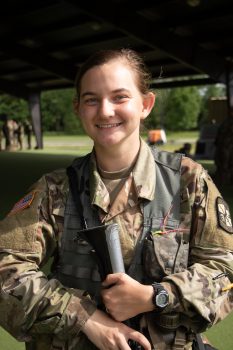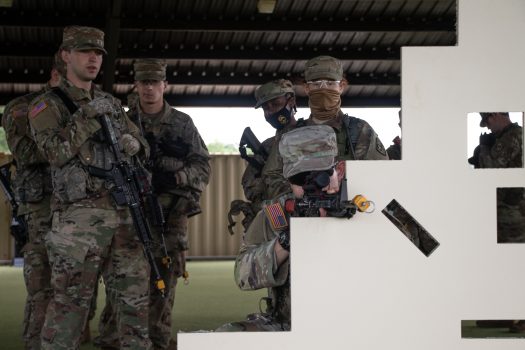On June 7, 2021, Cadet Erin Lunt, a rising senior from Stetson University in Florida, was one of the many 2nd Regiment Cadets that completed Preliminary Marksmanship Instruction (PMI). Lunt had very little experience in weapons training, so she was very eager for this event.

“I am not too familiar with the M4 weapon or many weapons in general. So I am really excited that we get the opportunity to practice and get really high-quality training before we go out to the range in a few days,” said Lunt.
The purpose of PMI training is to help Cadets become more familiar and knowledgeable on the basics of marksmanship. For many Cadets, like Lunt, they have little to no prior experience shooting or handling weapons; that makes this training event crucial because each Cadet must qualify at the shooting range later in the week.
The non-commissioned officer in charge of PMI, Sgt. 1st Class Aaron Kirkendall, said, “We’ve got a wide range of experience [with marksmanship] from Cadets– Everything from a Cadet whose program does not support marksmanship, and this is their first time holding a rifle, all the way up to prior service personnel.”

With so many levels of marksmanship present among Cadets, it fosters a peer to peer teaching environment at training events, such as PMI. Prior to the start of this event, Cadets were given the opportunity to brief each other on the operations to come; this segment is known as “training time.” Cadets are actually graded and assessed by Cadre on how they lead. Cadet instruction helps them feel more confident going into the actual training event.

Cadets participating in PMI will get a crash course on the fundamentals of shooting a rifle. While Cadets do not shoot live weapons at this event, they learn how to safely handle them, the various firing positions to use when shooting, proper sight alignment when aiming for the target, the minutes of angle (MOA) and mathematics behind trajectory, weapons maintenance, and weapons assembly and disassembly.
The technical knowledge that Cadets will gain from this event is substantial, and the leadership skills and connections that they make working with their platoons underlies their training experience– allowing for personal growth.
For Lunt, these interactions are very important. She says, “I am getting to know Cadets from a lot of different places… I am learning about working in a team of people that I have never met before and a lot about building bonds [with peers].”
Kirkendall, who is also a military science instructor at West Virginia State University, knows how important it is for Cadets to learn from each other and he elaborates on this notion by saying, “One of the best ways to lead is to teach; that gains respect amongst your peers… [Cadet leading] makes sure that all Cadets have the knowledge needed while they are teaching.”




